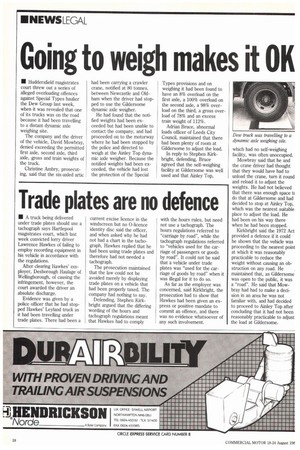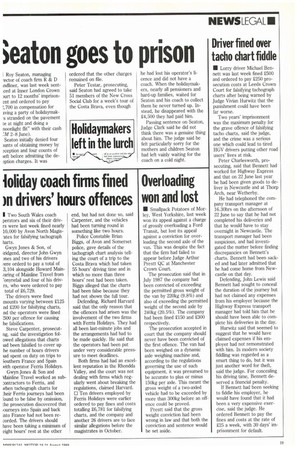Going to weigh makes it OK
Page 16

Page 17

If you've noticed an error in this article please click here to report it so we can fix it.
;eaton goes to prison
• Huddersfield magistrates court threw out a series of alleged overloading offences against Special Types haulier the Dew Group last week, when it was revealed that one of its trucks was on the road because it had been travelling to a distant dynamic axle weighing site.
The company and the driver of the vehicle, David Mowbray, denied exceeding the permitted first axle, second axle, third axle, gross and train weights of the truck.
Christine Arnbry, prosecuting, said that the six-axled artic had been carrying a crawler crane, notified at 80 tonnes, between Newcastle and Oldham when the driver had stopped to use the Gildersome dynamic axle weigher.
He had found that the notified weights had been exceeded but had been unable to contact the company, and had proceeded on to the motorway where he had been stopped by the police and directed to weigh at the Ainley Top dynamic axle weigher. Because the notified weights had been exceeded, the vehicle had lost the protection of the Special Types provisions and on weighing it had been found to have an 8% overload on the first axle, a 100% overload on the second axle, a 98% overload on the third, a gross overload of 78% and an excess train weight of 112%.
Adrian Bruce, abnormal loads officer of Leeds City Council, maintained that there had been plenty of room at Gildersome to adjust the load.
In reply to Stephen Kirkbright, defending, Bruce agreed that the self-weighing facility at Gildersome was well used and that Ainley Top, which had no self-weighing facility, was often unoccupied.
Mowbray said that he and the crane driver had thought that they would have had to unload the crane, turn it round and reload it to adjust the weights. He had not believed that there was enough space tc do that at Gildersome and had decided to stop at Ainley Top, which was the nearest suitable place to adjust the load. He had been on his way there when he had been stopped.
Kirkbright said the 1972 Act provided a defence if it could be shown that the vehicle was proceeding to the nearest point at which it was reasonably practicable to reduce the weight without causing an obstruction on any road. He maintained that, as Gildersome was open to the public, it was a "road". He said that Mowbray had had to make a decision in an area he was not familiar with, and had decided to proceed to Ainley Top after concluding that it had not been reasonably practicable to adjust the load at Gildersome. I Roy Seaton, managing -ector of coach firm R & D Indliner, was last week sentced at Inner London Crown )urt to 12 months' imprisonent and ordered to pay ,700 in compensation for aving a party of holidaymaks stranded on the pavement te at night and doing a noonlight flit" with their cash :M 2-8 June).
Seaton initially denied four )unts of obtaining money by 2ception and four counts of Left before admitting the deption charges. It was ordered that the other charges remained on file.
Peter Testar, prosecuting, said Seaton had agreed to take 51 members of the New Cross Social Club for a week's tour of the Costa Brava, even though he had lost his operator's licence and did not have a coach. When the holidaymakers, nearly all pensioners and hard-up families, waited for Seaton and his coach to collect them he never turned up. Instead, he disappeared with the 24,500 they had paid him.
Passing sentence on Seaton, Judge Clark said he did not think there was a genuine thing about him. The judge said he felt particularly sorry for the mothers and children Seaton had left vainly waiting for the coach on a cold night.










































